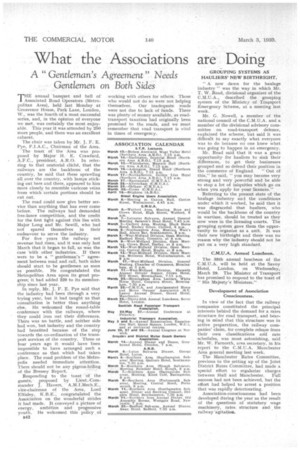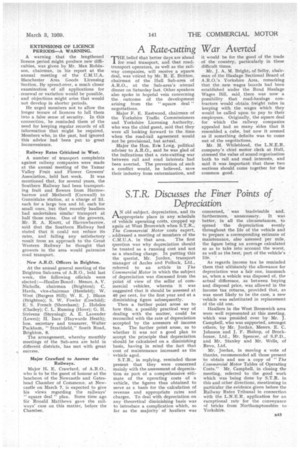What the Associations are Doing
Page 52

Page 53

If you've noticed an error in this article please click here to report it so we can fix it.
A "Gentleman's Agreement" Needs Gentlemen on Both Sides THE annual banquet and ball of Associated Road Operators (Metropolitan Area), held last Monday at Grosvenor House, Park Lane, London, W., was the fourth of a most successful series, and, in the opinion of everyone we met, was certainly the most enjoyable. This year it was attended by 250 more people, and there was an excellent cabaret.
The chair was taken by Mr. 3. F. E. Pye, F.I.A.C., Chairman of the Area.
• The toast of the Area was proposed by Major H. E. Crawthrd, A.F.C., president, A.R.O. In referring to that oratorial cliche, that the railways are the backbone of the country, he said that these sprawling all over the country, with lumps sticking out here and there, appeared to him more closely to resemble varicose veins from which -certain portions should be
cut out. .
The road could now give better service than anything that has ever come before. The railways had demanded free-lance competition, and the credit for the first fight against this lies with Major Long and Mr. Sewill, who had not spared themselves in their endeavour to serve the industry.
For five years the railway net revenue had risen, and it was only last March that it began to fall, as was the Case With other industries. If there were to be a. " gentleman's " agreement between road and rail, both sides should start to be gentlemen as soon as possible. He congratulated the Metropolitan Area upon its great progress; it had added 220 to its membership since last year. In reply, Mr. J. F. E. Pye said that the industry had been through a very trying year, but it had taught us that consultation is better than anything else. He welcomed the round-table conference with the railways, where they could iron out their differences. There was DO battle, and neither side had won, but industry and the country had benefited because of the step towards the co-ordination of the transport services of the country. Three or four years ago it would have been impossible to have arranged such a . conference as that which had taken place. The road problem of the Metropolis needed immediate attention. There should not he any pige-on-hbling of the Bressey Repo7t. .
Responding to the toast. 'of the guests, proposed by Lieut.-Commander J. Havers, A.M.I.Mech.E., vice-chairman of the Area, Lord EItisley, K.B.E.-, congratulated the Association on the wonderful strides it had made. It conveyed a picture of energy, ambition and progressive youth. He welcomed this policy . of
842 working with others for others. Those who would not do so were not helping themselves. Our inadequate roads were not due to lack of funds. There was plenty of money available, as roadtransport taxation had originally been promised to the roads, and we must remember that toad transport is vital in times of emergency, GROUPING SYSTEMS AS
HAULIERS' NEW BIRTHRIGHT.
" A new dawn for the haulage industry" was the way in which Mr. T. W. Read, divisional organizer of the C.M.U.A., described the grouping system of the Ministry of Trausport Emergency Scheme, at a meeting last week.
Mr. G. Nowell, a member of the national council of the C.M.U.A. and a member of the divisional advisory committee on road-transport defence, explained the scheme, but said it was difficult to say exactly what everyone was to do because no one knew what was going to happen in an emergency.
Mr. Read said that it was a great opportunity for hauliers to sink their differences, to get their businesses grouped and so defend their position in the commerce of England, " Out of this," he said, " you may become very strong and very powerful and be able to stop a kit of iniquities which go on when you apply for your licences."
Referring to the present state of the haulage industry and the conditions under which it worked, he said that it was disgraceful that hauliers, who would he the backbone of the country in wartime, should be treated as they now were in the licensing courts. The grouping system gave them the opportunity to organize as a unit. It was their new birthright and there was no reason why the industry should not be put on a very high standard.
C.M.U.A. Annual Luncheon.
The 55th annual luncheon of the C.M.U.A. will be held at the Savoy Hotel, London, on Wednesday, March 29. The Minister of Transport has promised to respond to the toast of " His Majesty's Ministers."
Development of Association Consciousness.
In view of the fact that the railway companies constituted the principal interests behind the demand for a rates structure for road transport, and haring in mind that this structure was in active preparation, the railway companies' claim, for complete release from their own classifications and rate schedules, was most astonishing, said Mr. W. Farnorth, area secretary, in his report to the C.M.U.A. Manchester Area general meeting last week.
The Manchester Rates Committee, previous to the setting up of the Joint District Rates Committee, had made a special effort to regularize charges between Hull and Manchester. Full success had not been achieved, but the effort had helped to arrest a position that was rapidly deteriorating.
Association-consCiousness had been developed during the year as the result of the questions of statutory wage machinery, rates structure and the railway 'agitatiou. EXTENSIONS OF LICENCE PERIODS—A WARNING.
A warning that the lengthened licence period might produce new difficulties, was given by Mr. Max Robinson, chairman, in his report at the annual meeting of the C.IVI.U.A, Manchester Area Goods Licensing Section. By spread-over, a much closer examination of all applications for renewal or variation would be possible, and objections might arise that would not develop in shorter periods.
He urged members not to allow the longer tenure of licences to lull them into a false sense of security. In this connection, he reminded them of the need for keeping regular records of all information that might be required. Members who, in the past, had ignored this advice had been put to great inconvenience.
Railway Rates Criticized in West.
A number of transport complaints against railway companies were made at the annual meeting of the Tamar Valley Fruit and Flower Growers' Association, held last week. It was mentioned that, for several years, the Southern Railway had been transporting fruit and flowers from Harrowbarrow and Metherell (Cornwall) to Gunnislake station, at a charge of 2d. each for a large box and id. each for small ones, but that recently hauliers had undertaken similar transport at half those rates. One of the growers, Mr. R. A. Knott, of Harrowbarrow, said that the Southern Railway had stated that it could not reduce its rates, and failing any satisfactory result from an approach to the Great Western Railway he thought that growers in the area would patronize road transport.
New A.R.O. Officers in Brighton.
At the annual general meeting of the Brighton Sub-area of A.R.O., held last week, the following officials were elected :—Haulier Board : Messrs. A. V. Nicholls, chairman (Brighton); C. Hards, vice-chairman (Henfield); W. West (Burgess Hill); W. E. J. Blann (Brighton); S. W. Fowler (Cowfold); E: S. French (Shoreham); J. Hobden (Chalky); C. L. Ruming (Hove); G. H. Strivens (Steyning); A. E. Lavender (Lewes); H. Ince (Haywards Heath); hon. secretary and treasurer, Walter Packham, " Strathfield," South Road, Brighton, 6.
The arrangement, whereby monthly meetings of the Sub-area are held in different districts, has met with great success.
Major Crawfurd to Answer the Railways.
Major I-L E. Crawfurd, of A.R.O., who is to be the guest of honour at the luncheon of the Newcastle and Gateshead Chamber of Commerce, at Newcastle on March 7, is expected to give his views regarding the railways' " square deal" plan. Some time ago Sir Ronald Matthews gave the railways' case on this matter, before the Chamber.




















































































